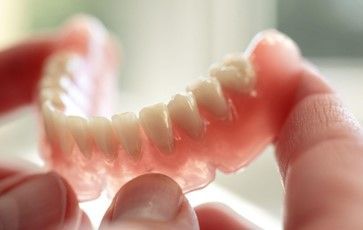4 Tips for Looking After Your Dental Crowns
Admin • October 27, 2020
Dental crowns can give new life to damaged teeth. These structures cover the tops and sides of a weak or compromised tooth, lending it additional strength and sealing gaps which might otherwise allow bacteria to enter and cause infections. If you wish to take care of your crowns, take the following four tips to heart.
1. Go Easy on Your Temporary Crown
Before you receive a permanent crown made of ceramic, zirconia, precious metal, or some other strong material, your dentist will fit you with a temporary crown made of resin. This resin crown, held in place with a relatively weak dental adhesive, only approximates the fit and bite you'll receive from its more robust replacement.
The somewhat delicate nature of a temporary crown may require you to treat it with special consideration during the couple of weeks that it must remain in your mouth. Take a break from challenging foods that require strong chewing action. Brush and floss gently and carefully so that you don't accidentally loosen the crown.
2. Watch What You Eat
When you cap a weak or broken tooth with a tough new permanent crown, you probably feel renewed confidence about using that tooth, and rightly so. However, dental crowns can break just like natural teeth when they bite down on the wrong things too firmly, forcing you to spend more money and time in the dentist's chair.
Avoid biting down with full power on ice cubes, hard candies, and other items that can damage your crowns. You'll find that a slight reduction in biting force still enables you to chew your food perfectly adequately without risking your dental restorations. You may also want to allow hard foods to soften in your mouth before chewing them.
Sticky foods can prove harmful to dental crowns as well. The dental adhesive that holds them onto teeth may have considerable strength, but it can still lose a tug-of-war with taffy candy or other unusually chewy foods. Either remove these items from your regular menu entirely or proceed with extreme caution.
3. Protect Your Crown Against Bruxism
Ceramic crowns can't quite match natural tooth enamel for strength and durability. As a result, they may wear or fracture more readily than your natural teeth when subjected to excessive force. Unfortunately, you can damage crowns (and teeth) without even realizing it if you suffer from bruxism (compulsive teeth grinding or clenching).
Bruxism typically occurs during sleep, although people can also grind or clench their teeth unconsciously while awake. Possible causes of bruxism include emotional stress, side effects of various medications, and bite alignment errors. Symptoms of bruxism include premature tooth wear, cracked teeth, and sore teeth or jaws.
You can protect your dental work against the effects of bruxism by asking your dentist to fit you with a nightguard. This appliance provides a shock-absorbing barrier between the upper and lower teeth while also helping to ease jaw tension. Braces, aligners, or other treatment options may also help correct a bite misalignment.
4. Maintain a Preventative Oral Care Plan
Even if your dental crown's surfaces can never succumb to the bacteria that cause tooth decay, keep in mind that the natural roots and enamel holding that crown in place can still sustain serious decay and damage. If this deterioration goes unchecked, the crown may detach from its organic moorings or you might lose the entire tooth.
In some respects, teeth fitted with crowns can face an even higher risk of decay than teeth without crowns. When dentists install crowns, they must leave a tiny gap beneath the base of the crown and the gumline. This gap can easily trap plaque and foster bacteria.
Make every effort to keep the structures within and beneath a dental crown as healthy and strong as possible. Brush and floss your crown just as carefully as you would a fully-natural tooth. Schedule twice-yearly dental checkups and cleanings to make sure that the crowned tooth remains in optimal health for many years to come.
Our team at Advanced Dental Care can install, adjust, or replace dental crowns as needed for healthy, functional, good-looking teeth. Contact
our clinic today.

Missing teeth can affect your daily life, from difficulty chewing and speaking to feeling self-conscious about your smile. If you're struggling with discomfort while eating, trouble speaking clearly, or noticeable gaps in your smile, it may be time to consider dentures or partials. These dental solutions can restore both the function and appearance of your smile, helping you regain comfort and confidence in your daily activities.

Learn effective tips for maintaining your oral health at home, including brushing, flossing, using mouthwash, and making healthy dietary choices. Discover the importance of hydration, regular self-exams, and avoiding tobacco use to keep your teeth and gums in top condition. This guide provides simple steps to help you maintain a healthy smile and prevent oral health problems.
Read this blog to explore the differences between dental crowns and bridges, their purposes, and how to choose the best option for your dental health.

Discover how oral health and overall wellness are connected. Explore how maintaining good dental hygiene can prevent systemic diseases, support heart and diabetes health, enhance digestion, and boost mental well-being. Learn practical tips for integrating dental care into your overall health strategy.
Do you use dentures? Read our blog to learn more about how to maintain your dentures and keep them in top shape.
Read this blog to learn some common dental issues in older adults and what you can do to maintain your oral health as you age so your smile never changes.
Read this blog post to learn more about practicing preventative dental care from a young age with your children. Contact us to find out more.
In this article, you will find six compelling reasons to get a dental checkup before leaving on vacation. Keep reading to learn more.
Many seniors make common oral health mistakes that can have serious consequences for their health. Discover some of the most prevalent oral health mistakes.






